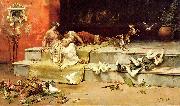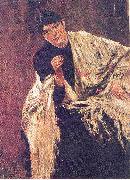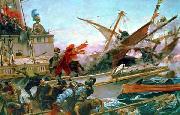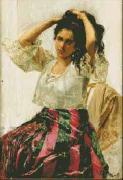Juan Luna Oil Painting ReproductionAll Juan Luna Oil PaintingsJuan Luna y Novicio (October 23, 1857 - December 7, 1899) was an Ilocano Filipino painter, sculptor and a political activist of the Philippine Revolution during the late 19th century. He became one of the first recognized Philippine artists. His winning the gold medal in the 1884 Madrid Exposition of Fine Arts, along with the silver win of fellow Filipino painter Felix Resurreccien Hidalgo, prompted a celebration which was a major highlight in the memoirs of members of the Propaganda Movement, with the fellow Ilustrados toasting to the two painters' good health and citing their win as evidence that Filipinos and Spaniards were equals. Regarded for work done in the manner of the Spanish and French academies of his time, Luna painted literary and historical scenes, some with an underscore of political commentary. |
|||

|
|||
|
|
|||
|
||||||||
| Juan Luna Juan Luna y Novicio (October 23, 1857 - December 7, 1899) was an Ilocano Filipino painter, sculptor and a political activist of the Philippine Revolution during the late 19th century. He became one of the first recognized Philippine artists. His winning the gold medal in the 1884 Madrid Exposition of Fine Arts, along with the silver win of fellow Filipino painter Felix Resurreccien Hidalgo, prompted a celebration which was a major highlight in the memoirs of members of the Propaganda Movement, with the fellow Ilustrados toasting to the two painters' good health and citing their win as evidence that Filipinos and Spaniards were equals. Regarded for work done in the manner of the Spanish and French academies of his time, Luna painted literary and historical scenes, some with an underscore of political commentary. |
||||||||
|
|
||||||||
| Gemälde IDENTIFIZIERUNG:: 95088 Las Damas Romanas 1882 Type oil on canvas Dimensions 100 cm x 170 cm cyf |
||||||||
|
|
||||||||
| Gemälde IDENTIFIZIERUNG:: 95096 Chula series 1885 Location Lopez Memorial Museum cyf |
||||||||
|
|
||||||||
| Gemälde IDENTIFIZIERUNG:: 95116 The Battle of Lepanto 1887 Location Senate Hall of Madrid (Spain) cyf |
||||||||
|
|
||||||||
| Gemälde IDENTIFIZIERUNG:: 95119 Una Mestiza Una Mestiza Date 1887 cyf |
||||||||
|
|
||||||||
| Gemälde IDENTIFIZIERUNG:: 97410 Herois anonims 1891 Medium oil on canvas Dimensions 195 X 258 cm cyf |
||||||||
|
|
||||||||
| VORHERIGER KÜNSTLER NÄCHSTER KÜNSTLER | ||||||||
|
|
||||||||
|
Juan Luna Juan Luna y Novicio (October 23, 1857 - December 7, 1899) was an Ilocano Filipino painter, sculptor and a political activist of the Philippine Revolution during the late 19th century. He became one of the first recognized Philippine artists. His winning the gold medal in the 1884 Madrid Exposition of Fine Arts, along with the silver win of fellow Filipino painter Felix Resurreccien Hidalgo, prompted a celebration which was a major highlight in the memoirs of members of the Propaganda Movement, with the fellow Ilustrados toasting to the two painters' good health and citing their win as evidence that Filipinos and Spaniards were equals. Regarded for work done in the manner of the Spanish and French academies of his time, Luna painted literary and historical scenes, some with an underscore of political commentary. |
||||||||
|
|
||||||||
|
KONTAKTIEREN Sie UNS |










